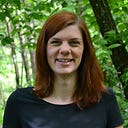Don’t let math scare you off — why coding is very much about language.
When I finally started to learn programming about two months ago, I had wanted to do it for a long time. It actually took me years to go from a shy “It would be kind of cool to learn programming” to “I’ll go for it now!”. I constantly collected small encouraging moments until I finally had enough of them to partly quit my job and invest in coding education.
One of those moments was a study that was published in Nature in March 2020. Ironically, I came across it while working as a science journalist at the Swedish Radio. (If you’re a Swedish speaker, you can hear the small news here. You won’t here my voice, but I swear, it was me who wrote the script for the news host.)
For the study, researchers had let 42 people learn programming in Python and tried to model their learning outcome with other skills and abilities. The results showed that what could best predict how easy it would be for a person to learn Python was fluid reasoning and working-memory capacity. But here comes the instersting part: The factor that was second best for predicting was language aptitude. Numeracy, in contrast, could barely be used to predict someones learning outcome when it came to programming. With other words: If you want to learn programming, it’s more important that you’re good at languages than that you’re good at math!
The study was a pretty small one (with 42 test persons) and I admit that I haven’t done research on how many other studies there are out there that might say different things. But for me, this study changed a lot. Like — wow! Forget math, it’s about language!
I don’t know why it actually made such a big difference to me. I’ve always been good at math and even liked it. And still, I always considered myself rather a language person. In the end, I wasn’t one of those cracks, solving equations for multidimensional spaces that are far beyond what a human mind can imagine or compare with reality. And I guess, I thought that I needed to be one of those to become a programmer. So I became a science journalist. Until that day I reported on that study…
Now that I have started to learn programming, I wonder where this idea came from that kept me from programmng for such a long time. So here is just a guess:
In the early days of programming, it might have been more abstract to write code and math is abstract as well. Even today, you can use complicated math if you want to understand the theory behind programming. And depending on what type of programming you do today, you might need math for some of them as well. But the days of the early, abstract languages are decades ago!
During the first weeks of my education, I wrote code like this:
I’m confident that, as long as you know the English language you can get a rough idea on what this code you see above is about. Even if you don’t know anything about coding and don’t have a clue about math.
